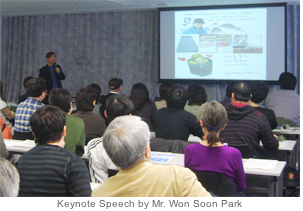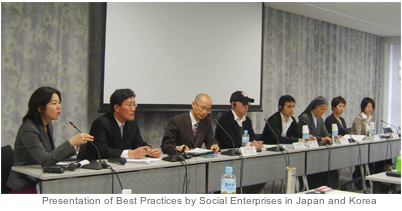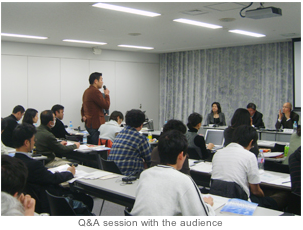Activity Reports:Japanese Studies and Intellectual Exchange:Report on the Symposium "Social Enterprises Lead the Way to New Japan-Korea Partnership"
Asia and Oceania Section
Japanese Studies and Intellectual Exchange
The Japan Foundation hosted a symposium "Social Enterprises Lead the Way to New Japan-Korea Partnership" at the Japan Foundation Headquarters in Tokyo on March 7, 2009.
・Click here for "Main Activities" page on this symposium (In Japanese)
Keynote Speech
Experts and entrepreneurs were invited from Japan and Korea to this symposium. The keynote speaker was Mr. Won Soon Park, Executive Director of The Hope Institute and human rights attorney. Entitled as "Characteristics, Roles, and Issues of Social Enterprises in Korea," Mr. Park described the awareness of donation and the reasons of success of social enterprises in Korea. He was a student activist in 1970s and has been active as a human rights attorney since 1980s. Throughout these years, he has worked to bring institutional changes and social justice to Korea.
 The Hope Institute launched a website for fund-raising in order to foster an awareness of donation among people in Korea. In this on-line fund-raising process, their finance including employee salary was completely disclosed. This transparent and reliable system won public trust, collecting 13 billion won in 2008. In addition, the Institute has been bringing innovative ideas into business projects: for instance, the Beautiful Store is a recycle shop project with 100 stores throughout the country supported by 200 staff and 5000 volunteers, despite the fact that recycle had not been a familiar concept in Korea before this project was launched. Another instance is a company that succeeded in branding bags that were made of waste plastic sheets.
The Hope Institute launched a website for fund-raising in order to foster an awareness of donation among people in Korea. In this on-line fund-raising process, their finance including employee salary was completely disclosed. This transparent and reliable system won public trust, collecting 13 billion won in 2008. In addition, the Institute has been bringing innovative ideas into business projects: for instance, the Beautiful Store is a recycle shop project with 100 stores throughout the country supported by 200 staff and 5000 volunteers, despite the fact that recycle had not been a familiar concept in Korea before this project was launched. Another instance is a company that succeeded in branding bags that were made of waste plastic sheets.
After the times of colonial and military-government rules, Korea became democratic and achieved its economic development mainly led by conglomerates and industrial giants. Although the giants-centered economic structure has been collapsing after IMF crisis in 1997, the conglomerates-led structure still remains. In order to achieve more democratic and independent economic development, the Hope Institute is vigorously making new attempts, such as building the framework to support local companies and venture companies, as well as the system to collect ideas from the public via the Internet.
Social Enterprises in Korea
Next, best practices of social enterprise in Japan and Korea were described. The first example was the Beautiful Shop described above, presented by Mr. Jae Chun Kim, Director of Policy Bureau of the Beautiful Shop. It is said that the Beautiful Shop has changed the concept of recycling in Korea. In the past, used products were not popular in Korea, so there had hardly been a sense of recycle. The Beautiful Shop, however, improved an image of recycle business by sophisticated shop design and good customer satisfaction. Stocking a plenty of items to place on sale, the Beautiful Shop expanded its network by opening four or five new stores a month at most. In addition, it launched a year-long campaign with a newspaper company to run an advertisement on the newspaper and a 40-minute TV program every week, and to organize events. These activities boosted the recognition of the Beautiful Shop. While a customer spends 2000 won at a shop on average, the annual sales of the Beautiful Shop project reaches 12.4 billion won. It proves that this project has changed the Korean society.
Next presenter was Mr. Jong Whee Kim, the Vice-President of The Seoul Municipal Youth Job Experience Center (Haja center). Mr. Kim introduced "Noridan," a group of performers with musical instruments made of recycled materials. As one of Haja Center's projects, Noridan started in 2004 with eleven members including musicians, directors, composers, and others who had no background in arts. They made instruments from waste materials such as car wheels to play music and start their performances and workshops. At present, 87 members are working for Noridan including young people who quit their schools and attended the free school organized by Haja Center before participating in Noridan; office employees who wanted to change their lives by joining in Noridan; and people in their sixties who wanted to keep working after retirement. The breakdown of Noridan's profits is; revenue from performances 50%; revenue from educational activities including workshops 25%; and revenue from sales of musical instruments and installation of instruments in parks 25%. Noridan's goal over the next few years is to increase revenues other than from performances.
The last presenter was Ms. Jin Won Cho, the CEO of WeCan. As a social welfare juridical person, WeCan employs people with disabilities to bake and sell cookies. The reputation of cookies has been spread by word of mouth owing to its quality, not because the bakers were people with disabilities. Ms. Cho said, "Business can't be maintained if customers buy products out of charity." Employees are treated based on their job performances; those who are good at their job wear scarves around their necks and are in charge of sanitary inspection and work management. Such merit-based personnel system as in profit-oriented companies stimulates the employees' motivation for working.

Social Enterprises in Japan
Presentation of best practices in Japan started with "kotolab. LLC" that has been engaging in a community revitalization project in Kotobuki-cho, Yokohama. Mr. Tomohiko Okabe is President of kotolab.LLC who launched projects to attract visitors and artists from Japan and abroad to Kotobuki-cho. It used to be a town of day laborers and exude an image of dirty and tough neighborhood. "Awareness of people in this community has obviously changed," said Mr. Okabe. Local hotels used to receive day laborers, but now the owners of these hotels are giving thought to how tourists can spend their visit comfortably. More and more people in local community are eager to communicate with tourists and they are gradually regarding their community as "not too bad." Recently, the number of hostels is increasing in Kotobuki-cho, but Mr. Okabe stated with confidence that people were building facilities just like those of kotolab.LLC because their business model was regarded as success.
Next presenter was a private art studio for people with Down syndrome, "Atelier Element Present (AEP Tokyo)." AEP Tokyo created an environment where artists with Down syndrome can continue creating their works with their own rhythm, as well as organized exhibitions and sold artworks. "An increasing number of people and companies are sympathetic to AEP Tokyo. Many young people are participating in our activities; for example, art students are volunteering at our art studio. This is quite encouraging," said Ms. Yoshiko Sato, President of AEP Tokyo.
The last presenter is Ms. Rena Otsuka, President of Ecotwaza Co., Ltd. The objective of Ecotwaza was to be a bridge between Japanese eco-friendly technology and the world. "Foreigners are attracted to Japanese products and technology more than Japanese people think," said Ms. Otsuka. "Although there are many small businesses and local companies that are producing excellent products in Japan, there had been no medium to connect those companies to the world." With this new perspective, Ecotwaza has been providing powerful, fashionable and exciting services to change the self-sacrificing and negative image of environmental issues.
Discussion
 After presentation of best practices, a panel discussion was held with presenters. They discussed passionately about common grounds between Japan and Korea, lessons they can learn from each other, ideal relationships with governments, and their marketing strategies.
After presentation of best practices, a panel discussion was held with presenters. They discussed passionately about common grounds between Japan and Korea, lessons they can learn from each other, ideal relationships with governments, and their marketing strategies.
Due to drastic social change, both Japan and Korea are facing a variety of issues in the fields that directly affect our daily lives, such as medical, welfare, education, and environment. Social enterprises will play more important roles in these countries as new approaches to deal with these issues.
A similar conference or symposium gathering experts and entrepreneurs of social enterprises is scheduled to be held in Korea in the begining of 2010. The Japan Foundation will further support exchanges between the people of Japan and Korea who are striving to build better societies by utilizing the network that was built in this symposium.
Related Articles
Back Issues
- 2025.9.30 The 51st Japan Found…
- 2025.9.30 The Japan Foundation…
- 2025.9.30 Bringing the World C…
- 2025.9.30 The 51st (2024) Japa…
- 2025.9.30 Japan Foundation Pri…
- 2024.5.24 The 50th Japan Found…
- 2024.3. 4 Movie Theaters aroun…
- 2023.4.10 The 49th Japan Found…
- 2023.3.28 JF's Initiatives for…
- 2023.1.27 Living Together with…

